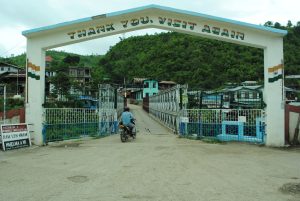The Indian government has reimposed restrictions on foreign nationals wishing to travel to some states in the country’s sensitive northeastern region owing to “growing security concerns,” 13 years after they were relaxed.
The Union Ministry of Home Affairs has decided to reimpose the Protected Area Regime (PAR) in the states of Manipur, Nagaland and Mizoram to restrict and monitor the movement of foreigners. Henceforth, foreigners visiting these states will have to apply for and obtain the Protected Area Permits (PAP) from the government. The permit will include details such as the place of entry, residence and period of stay.
The PAR was introduced in 1958 for areas between the “Inner Line” as defined in the government directive and the “International Border” of the concerned state. The guidelines stipulate certain zones within the protected areas, which tourists can visit with a permit. All foreigners visiting these states must also register themselves with the Foreigners Registration Officer (FRO) of the district they visit within 24 hours of arrival.
Arunachal Pradesh in the northeastern region and Andaman & Nicobar Islands in the Bay of Bengal are also wholly under the PAR. Some areas of other states like Sikkim, Himachal Pradesh, Kashmir, Ladakh, Rajasthan and Uttarakhand also come under the regime.
The restrictions were relaxed in 2011 to boost tourism in the three northeastern states, which are “special category states” that are heavily dependent on the central government for funds. However, the relaxing of restrictions did not apply to citizens of Afghanistan, China and Pakistan, who continued to require prior approval from the government for entry into these states.
Soon after the regime was reimposed, the Bharatiya Janata Party (BJP)-led government in Manipur said the decision was necessitated by the influx from neighboring countries. Chief Minister N. Biren Singh’s statement, which was also echoed by some civil society groups in the state, alleged that illegal immigrants from Myanmar was a key factor for triggering ethnic strife in the state between the majority Meitei and Kuki-Zo communities.
Incidentally, the government scrapped the Free Movement Regime (FMR) with Myanmar last year to ensure the “internal security of the country” and to maintain the “demographic structure” of India’s northeastern states that share borders with Myanmar. The FMR allowed citizens from one country to travel up to a distance of 16 kilometers (10 miles approximately) on the other side for a stipulated period.
An important reason for the PAP’s reimposition in Manipur, Mizoram and Nagaland seems to be what Indian government sources allege as “suspicious activities” of foreign nationals over the past several years.
“There were many episodes when foreign citizens were found engaging in activities harmful to the interests of the country. Some among them have even gone to the extent of provoking the citizens of these states to consider themselves as belonging to another country,” an official claimed. Describing the example of Daniel Stephen Courney’s secret visit to Manipur as alarming, the official said it had prompted the government to fast-track the decision to reimpose PAP in the three states.
An evangelist from the U.S., Courney’s visit to Manipur created a flutter among security agencies in Manipur and New Delhi. A video circulated which showed him distributing a drone, socks and bullet-proof vests to militants in Manipur. The report also quotes from his YouTube channel “Fool For Christ” where he claims that he had visited “war zones” in the state of Chhattisgarh.
Indian government sources claimed that Courney hails from New Jersey in the U.S. and had served in the U.S. military for some years before leaving his job to become a full-time evangelist. The video was shot during a secret visit to Manipur in the latter part of 2023 from Thailand through Myanmar.
In another incident in end-2022, four foreign nationals from Canada and the U.S. were apprehended by the Indian border police along Manipur’s border with Myanmar as they were about to cross over to the neighboring country. They were interrogated and instructed to exit from the state immediately.
The governments of the three states have reacted differently to the central government’s decision to reimpose the PAR. The Nagaland and Mizoram governments have urged the central government to exclude their state from the purview of the regime. The ruling Zoram People’s Movement of Mizoram has said that the flow of tourists to the state could be adversely impacted by PAR’s reimposition.

































